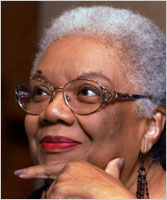
Lucille Clifton
Living with a depressive condition has put me on a constant search for the right words. I look for the right words to explain how this feels – from the inside out. I experiment with metaphors, placing them in my mouth, rolling them around my tongue in different sentences, to see if they taste right. It’s grief, but not really. It’s sadness, but worse. It’s happiness, but better.
This search sends me groping blindly into bookstores and libraries. I pull the books off my shelves. I flip through calendars with pithy sayings. I read the memoirs. I’m looking for words that can describe, even if in quilt scraps, what I’m trying to tell the people closest to me . . . and the people I’ll never meet.
When I found Lucille Clifton’s untitled poem, I painted the words around the ceiling of my bedroom in a dark red: “come celebrate with me . . . come celebrate with me. . .”
There is not much celebration in the throes of depression. There aren’t a lot of parties. The jubilation of the world is experienced in muted tones like an old movie in black and white with no audio. I’m there, but there’s little color, little sound. Some days, my arsenal of healthy management tools works: exercise for endorphins, healthy food with Omega-3s for my brain, doses of sunshine, connecting with friends, deliberate breathing to center and calm anxiety, the sense that God hears my prayers. Other days, I lose. The time goes by, and no work gets done. I forget to eat, or I refuse to force myself to eat when my appetite left two days ago. I get out of bed, I get dressed, but nothing else happens. The images on the television screen roll by, but nothing stays with me. I don’t even bother to talk to God.
I am well aware that I am living with something that can kill me. The best thing about going to bed that night – if sleep is my friend – is knowing that tomorrow is another day. I made it through this one. And I will try again tomorrow. And even though I feel like the self that I know-and-love-and-prefer lost the battle, I am still here. And, Lucille Clifton reminds me to celebrate that.
won’t you celebrate with me
what i have shaped into
a kind of life? i had no model.
born in Babylon
both nonwhite and woman
what did i see to be except myself?
i made it up
here on this bridge between
starshine and clay,
my hand holding tight
my other hand; come celebrate
with me that everyday
something has tried to kill me
and has failed.
I can’t claim that Clifton was writing about depression, or that she knows this experience firsthand. I never met her, but think of her as a majestic woman. A former poet laureate of Maryland, winner of a National Book Award and two-time Pulitzer Prize nominee (in the same year), her work appears in over 100 anthologies. Her words surrounded those who dared to look for them. Her recent passing (on February 13, 2010) reminds me of the power of words to touch people far beyond one’s physical grasp. She reminds me that there is celebration in what appears to be loss. May she join the star shine she lived so close to.
I will miss Clifton as one misses a great teacher. My colleague Valerie Bridgeman wrote it well in a poem memorializing Clifton. To Clifton, Bridgeman writes: “ you taught me how to praise and to rage.” For this, I pour water today.
Here’s a clip of Clifton reading this famous poem:
http://open.salon.com/blog/readwillett/2010/02/13/remembering_lucille_clifton





Like this sista. Love this Clifton poem. Thanks for this.
ikard
I listened with my heart not my head
And a river of tears flowed.
The heaving of my chest released the oft-felt pain
Then a small voice whispered, “This is good.”
My favorite Lucile Clifton poem is “Listen Children.”
Dr. Coleman. Thank you for your honest and grace-filled post. Your words are speaking life to me even as I make it through the end of winter, which for me means more than cold weather and snow. I am also inspired by your academic witness and your resilience in the midst of depression.
Lucille Clifton reminds us that it's not just about the words, but the life that led to the words.
Language halts behind intuition… Our understanding outruns the ordinary usages of words. Philosophy is akin to poetry.
A.N. Whitehead, Modes of Thought